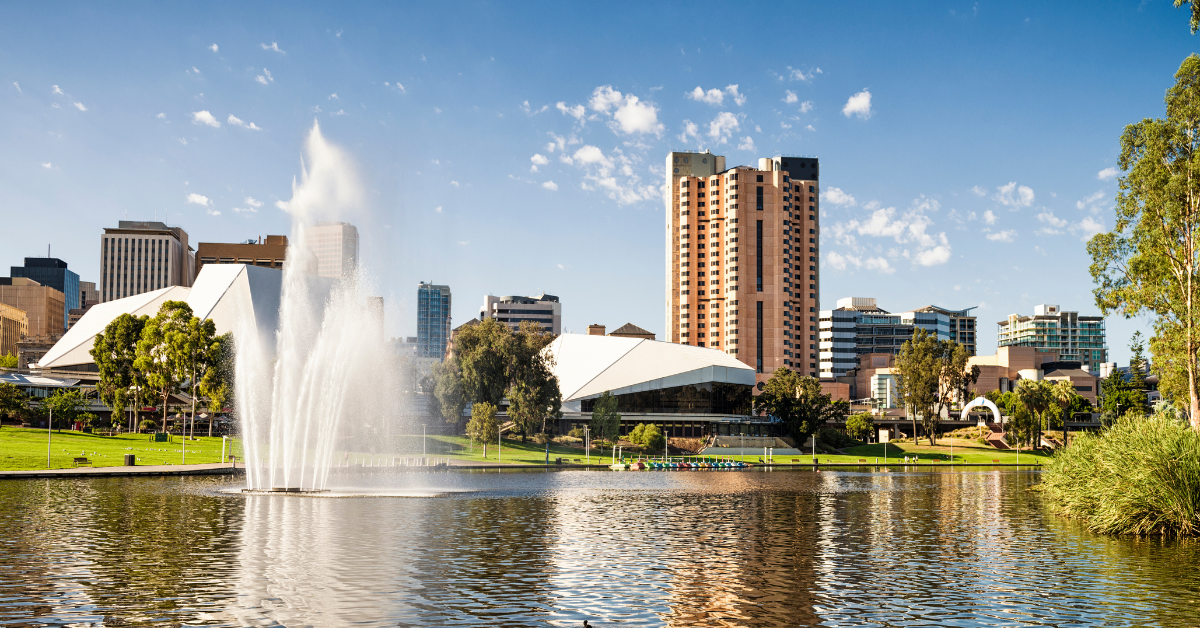Adelaide, the capital of South Australia, is known for its calm climate and cultural harmony.
In Japan, it is usually written in katakana, but it occasionally appears as “安的来得”, a Chinese phonetic rendering not used in Japanese.
This article explores the origin of the name “Adelaide” and the quiet charm Japanese people find in this peaceful city.
The Background of the Name “Adelaide”
Adelaide (Adelaide) was founded in 1836 as the capital city of South Australia.
The name derives from Queen Adelaide of Saxe-Meiningen, the wife of King William IV of the United Kingdom.
The queen was known for her compassion and dignity, and the city inherited her ideals of grace, order, and harmony. Adelaide’s design also reflects this philosophy, with parks, squares, and green belts integrated throughout the city.
In Japanese, the name is written in katakana as “アデレード.”
However, in Chinese, the transliteration “安的来得 (ān dì lái dé)” is used to approximate the pronunciation.
It is chosen purely for phonetic accuracy, not for meaning.
The Meaning and Structure of “安的来得”
| Kanji | Meaning | Sound Correspondence |
|---|---|---|
| 安 | Peace, calmness | ān (A) |
| 的 | Precise, possessive particle | dì (De) |
| 来 | To come, arrival | lái (Lai/Re) |
| 得 | To obtain, to achieve | dé (De/Do) |
This representation is a phonetic rendering based on Mandarin pronunciation.
In contrast, Japanese typically emphasizes sound reproduction rather than semantic meaning, which is why katakana is used for foreign place names.
This distinction reflects cultural and linguistic differences:
Japanese focuses on preserving the foreign sound, while Chinese values the balance between sound and meaning. Both systems reflect a deep appreciation for linguistic beauty.
How Japanese People Perceive Adelaide
To Japanese people, Adelaide is often seen as a city of tranquility, nature, and education.
Although it lacks the fame of Sydney or Melbourne, it attracts those seeking a “city where one can live at their own pace.”
| Impression | Description |
|---|---|
| Safety | Low crime rate; ideal for families and international students |
| Nature | Vineyards, coastline, and rolling hills offer close contact with nature |
| Education | Home to prestigious universities such as the University of Adelaide |
| Living Costs | More affordable compared to larger Australian cities |
| Atmosphere | Calm, cultural, and relaxed |
Adelaide perfectly balances urban convenience with rural serenity, making it an ideal place for Japanese people who value peaceful and high-quality living.
The Passion for Sports in Adelaide
Adelaide has a deep-rooted sports culture.
Australian Rules Football (AFL), cricket, and cycling are integral parts of local life.
| Sport | Feature |
|---|---|
| AFL (Australian Rules Football) | The local team, Adelaide Crows, enjoys passionate citywide support |
| Cycling | The city hosts the Tour Down Under, a world-class cycling event |
| Cricket | Matches are played at the historic Adelaide Oval |
| Tennis | Early-year international tournaments attract top global players |
Sports are a core part of Adelaide’s community identity, and the entire city comes alive on game days.
Schools and universities promote athletic participation, and the city’s residents maintain an active lifestyle through jogging, cycling, and outdoor recreation.
This balance between health, community, and leisure defines the city’s spirit.
Harmony Between Education, Culture, and Sports
Adelaide is a city where learning, living, and leisure coexist naturally.
It is one of the most popular destinations for Japanese students, offering a safe and intellectually stimulating environment.
| Field | Characteristics |
|---|---|
| Education | World-ranked universities like the University of Adelaide and the University of South Australia |
| Culture | Famous for arts festivals such as the Adelaide Festival and Fringe |
| Lifestyle | Efficient public transport and reliable healthcare enable long-term stays |
| International Exchange | Sister-city partnerships foster strong ties with Japan |
Education, culture, and sports are seamlessly intertwined, creating a city that nurtures both intellect and well-being.
In such an environment, students and residents can focus on growth while enjoying a fulfilling, balanced life.
Cultural Connections Between Japan and Adelaide
Adelaide and Japan have built deep cultural and educational ties over the years through sister-city relationships and international exchange programs.
The annual Japan Festival celebrates Japanese food, art, and traditions, drawing large local crowds.
Language education also plays a key role:
Many Australian students who study Japanese choose Adelaide as their base for cultural immersion.
This goes beyond language learning, fostering genuine cross-cultural understanding.
Through these initiatives, both Australians and Japanese discover the joy of cultural exchange and build mutual respect across borders.
Lifestyle and Emotional Richness in Adelaide
The people of Adelaide embrace a lifestyle rooted in connection with nature and community.
Their philosophy emphasizes “quality of life over speed”, which resonates strongly with Japanese cultural values that cherish harmony and mindfulness.
| Value | How It Is Reflected in Adelaide |
|---|---|
| Harmony | Urban planning that integrates city spaces with nature |
| Health | A culture of walking, cycling, and outdoor exercise |
| Learning | Strong culture of lifelong education with public libraries and lectures |
| Community | A welcoming society that embraces multiculturalism |
This shared sense of balance and tranquility explains why Japanese visitors often describe Adelaide as “a place where the heart feels at peace.”
Whether for travel, study, or relocation, Adelaide offers a setting that feels both comforting and inspiring.
Conclusion
The Kanji form “安的来得” is a Chinese transliteration of “Adelaide”, not a Japanese name.
Nevertheless, it symbolizes the connection between language, culture, and understanding.
Adelaide stands as a city of calmness, education, and cultural sophistication.
It teaches us the value of “living quietly yet richly”, where people can focus on what truly matters—personal growth, harmony, and human connection.
For those who seek a life enriched by nature, learning, and sport, Adelaide represents the ideal balance between serenity and vitality.






